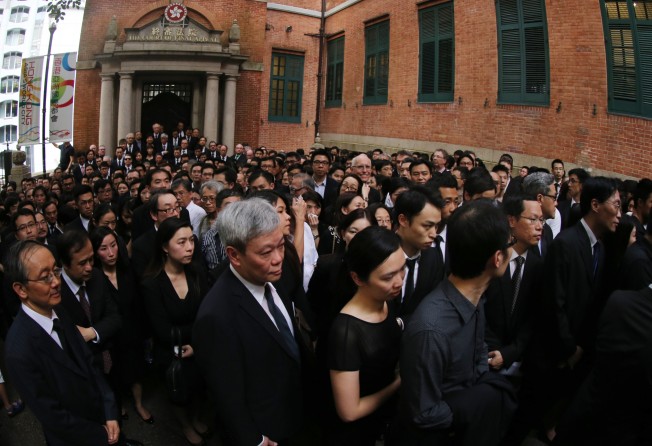White paper aims to renew nation's contract with Hong Kong people
Regina Ip says Beijing's white paper is simply a modern incarnation of Chinese rulers' practice of old to engage the people on the issues of legitimacy and rights

China's first ever white paper on the implementation of "one country, two systems", although heavily criticised in legal and pro-democracy circles, aroused little attention in the wider community. Briefings for schools, business and youth groups showed that few had read the document, let alone digested its content.
Why then have the authorities in Beijing taken the trouble to print it and translate it into seven languages? Beijing considered sending two senior officials to Hong Kong to explain and publicise the content. The visit was called off at the last minute, apparently to avoid further turning up the heat.
The publication of the white paper may be described as the modern incarnation of the practice, long cherished by Chinese rulers, of directly engaging the people. As early as 89BC, Emperor Wu of the Han dynasty wrote the Repenting Edict of Luntai to publicly apologise for his policy mistakes and the sufferings inflicted on the people.
In 1729, Emperor Yongzheng of the Qing dynasty took pains to compile a voluminous publication, Awakening from Delusion, to provide the moral justification for the Manchu rule over China. Frustrated by the Han Chinese' rejection of his legitimacy on the grounds of the Manchu's racial and cultural inferiority, Yong- zheng rebutted the attacks on his integrity and the moral basis for the Manchu rule. For this emperor, widely believed to have died in office for working too hard, staying silent was not an option.
With its five chapters outlining China's policy on the establishment of the Hong Kong special administrative region, the comprehensive progress made in Hong Kong since then, and the efforts made by Beijing to ensure Hong Kong's prosperity and stability, the accent of the white paper is on the last chapter - which stresses the importance of fully and accurately understanding and implementing "one country, two systems".
The very fact that Beijing authorities have seen fit to make this plea the central theme of the concluding chapter is indicative of the deep concern in Beijing that "some people in Hong Kong" have not yet "felt comfortable with the changes", while some are "still confused or lopsided in their understanding of 'one country, two systems'". It was probably this concern, similar to the concern of Yongzheng that he had been misunderstood, or that the moral legitimacy for his rule had not been adequately spelt out, which led Beijing to publish the white paper.
Some assertions in the white paper have caused discomfort in some quarters. One of them is the call for Hong Kong to "stay alert to the attempt of outside forces to use Hong Kong and to interfere in China's domestic affairs", and so on. Hong Kong being an open and multicultural, international city, the influence of Western ideology is pervasive and powerful. Beijing cannot possibly be objecting to Western influence per se, which it knows is part of the unique characteristic of Hong Kong. Even specific acts of "interference" or "collusion" are hard to define and counter, short of exposing cut-and-dried incidents of espionage or illegal campaign financing or financial sponsorship of politicians, which appear to be surfacing right now.
Even more troubling to some - especially lawyers - is the call, in the final chapter, for all involved in "administering" Hong Kong, including judges, to be patriotic. It is a call that appears to run counter to the very basis of the Western legal system, which Max Weber characterised as "highly formalistic", in the sense of being derived by logical reasoning from abstract legal propositions. It is through such a system that Western law manages to stand above the fiat of rulers. For this affront, lawyers clad in black took to the street to signal displeasure.
The ideological difference in the Chinese and Western perceptions of the rule of law is compounded by a semantic problem - the reference to judges as "administrators". Judges wield real power. Judges in Hong Kong, as they do elsewhere, make decisions that can change the course of society. Here, we have the landmark judgment in the Chong Fung-yuen case, which substantially broadened the definition of Chinese nationals who have the right of abode in Hong Kong, and other decisions of major import.
Considering that the nominees for Supreme Court appointments in the US have to pass muster with Congressional lions over their values and beliefs, and that it would be unthinkable for an unpatriotic judge to be appointed to the US Supreme Court, the appeal in the white paper should not be viewed as something entirely out of the ordinary.
Indeed, how to ensure judges support the national goal without undermining the key, distinguishing strength of the Western legal system is one of the challenges in implementing "one country, two systems".
The white paper is an appeal for understanding, and also an attempt to renew the nation's contract with Hong Kong people. The paper is about the help that Beijing has afforded Hong Kong to ensure its prosperity, stability and international character. It is also about how Hong Kong can make use of its Western systems and know-how to contribute to the "two centenary goals" and the "Chinese dream". In sum, it is about give and take, as in all relationships.
Regina Ip Lau Suk-yee is a legislator and chair of the New People's Party